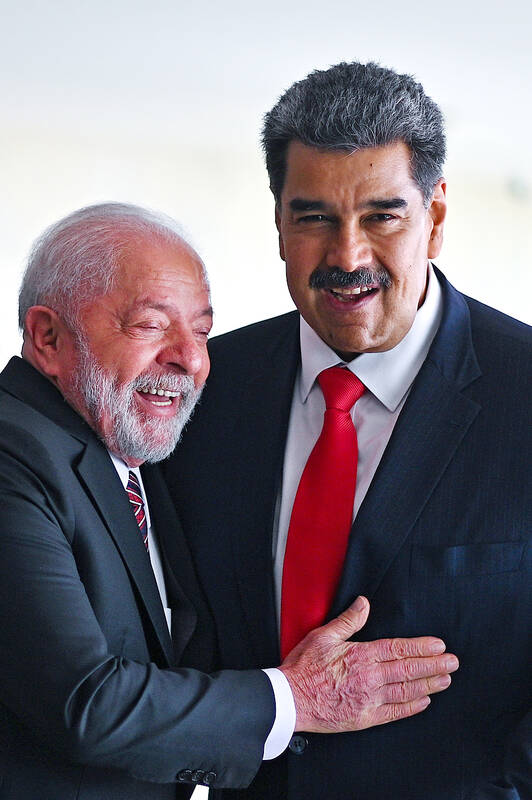Brazilian President Luiz Inacio Lula da Silva was yesterday scheduled to host fellow South American leaders for a “retreat” aimed at strengthening ties in a region where left-wing governments are newly back in style.
Eleven of the continent’s 12 heads of state are due to attend the summit in Brasilia — the first of its kind in nearly a decade — with only Peruvian President Dina Boluarte expected to miss it.
Veteran leftist Da Silva started things on Monday by meeting Venezuelan President Nicolas Maduro and hailing the “historic” restoration of a relationship that was severed under his predecessor, far-right former Brazilian president Jair Bolsonaro.

Photo: EPA-EFE
Brazil had cut diplomatic ties with Maduro’s government under Bolsonaro, who labeled the socialist leader a “dictator.”
“This is the start of Maduro’s return, and [yesterday’s] meeting will be the return of South American integration,” Da Silva told a news conference, after greeting his Venezuelan counterpart at the presidential palace with a hug and a back-slap.
Da Silva, who led Brazil from 2003 to 2010, is a self-declared fan of international cooperation and “regional integration,” which featured prominently in his first presidency, and is keen to reboot stalled South American ties.
This is the first summit of regional leaders since 2014 in Quito, Ecuador, at a gathering of the Union of South American Nations, a continental bloc launched in 2008 by Da Silva and late Venezuelan president Hugo Chavez.
That was the moment of Latin America’s so-called “pink tide,” when a wave of left-wing governments led the region.
Now, some political analysts are talking of a “new pink tide” in South America, with the recent election of Da Silva, Chilean President Gabriel Boric and Colombian President Gustavo Petro.
Da Silva wants to get the region cooperating again.
His government has touted projects such as a “Bi-Oceanic Corridor,” a transportation artery to enable countries to ship goods from one side of the continent to the other overland instead of by sea.
The summit would be a small, “more relaxed” gathering, with only the leaders, their foreign ministers and select advisers in the room, a Brazilian diplomatic source said.
“Groundbreaking visions” for South America’s future are unlikely to emerge from the summit, political scientist Oliver Stuenkel said.
However, “the meeting itself is good news,” he wrote in Americas Quarterly.
“Even a basic dialogue between heads of state is genuine progress after Brazil largely retreated from its neighborhood during the Bolsonaro years,” he said.
Since Da Silva defeated Bolsonaro in a divisive election to return to office in January, he has been overhauling Brazil’s foreign policy, vowing to seek friendly relations across the board and cultivating closer ties with partners as disparate as China and the US.
However, he has drawn attacks from opponents for being overly cozy with Russia, China and Latin American leftists such as Maduro and Nicaraguan President Daniel Ortega, who are accused of human rights violations.

China yesterday held a low-key memorial ceremony for the 1937 Nanjing Massacre, with Chinese President Xi Jinping (習近平) not attending, despite a diplomatic crisis between Beijing and Tokyo over Taiwan. Beijing has raged at Tokyo since Japanese Prime Minister Sanae Takaichi last month said that a hypothetical Chinese attack on Taiwan could trigger a military response from Japan. China and Japan have long sparred over their painful history. China consistently reminds its people of the 1937 Nanjing Massacre, in which it says Japanese troops killed 300,000 people in what was then its capital. A post-World War II Allied tribunal put the death toll

‘NO AMNESTY’: Tens of thousands of people joined the rally against a bill that would slash the former president’s prison term; President Lula has said he would veto the bill Tens of thousands of Brazilians on Sunday demonstrated against a bill that advanced in Congress this week that would reduce the time former president Jair Bolsonaro spends behind bars following his sentence of more than 27 years for attempting a coup. Protests took place in the capital, Brasilia, and in other major cities across the nation, including Sao Paulo, Florianopolis, Salvador and Recife. On Copacabana’s boardwalk in Rio de Janeiro, crowds composed of left-wing voters chanted “No amnesty” and “Out with Hugo Motta,” a reference to the speaker of the lower house, which approved the bill on Wednesday last week. It is

FALLEN: The nine soldiers who were killed while carrying out combat and engineering tasks in Russia were given the title of Hero of the Democratic People’s Republic of Korea North Korean leader Kim Jong-un attended a welcoming ceremony for an army engineering unit that had returned home after carrying out duties in Russia, North Korean state media KCNA reported on Saturday. In a speech carried by KCNA, Kim praised officers and soldiers of the 528th Regiment of Engineers of the Korean People’s Army (KPA) for “heroic” conduct and “mass heroism” in fulfilling orders issued by the ruling Workers’ Party of Korea during a 120-day overseas deployment. Video footage released by North Korea showed uniformed soldiers disembarking from an aircraft, Kim hugging a soldier seated in a wheelchair, and soldiers and officials

Cozy knits, sparkly bobbles and Santa hats were all the canine rage on Sunday, as hundreds of sausage dogs and their owners converged on central London for an annual parade and get-together. The dachshunds’ gathering in London’s Hyde Park came after a previous “Sausage Walk” planned for Halloween had to be postponed, because it had become so popular organizers needed to apply for an events licence. “It was going to be too much fun so they canceled it,” laughed Nicky Bailey, the owner of three sausage dogs: Una and her two 19-week-old puppies Ember and Finnegan, wearing matching red coats and silver